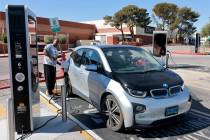Electric cars threaten gas engines
After more than 100 years, it appears that the internal-combustion engine is about to lose its fire.
This type of serious-yet-gradual phase-out/phase-in change to new-vehicle development had to eventually get under way, but that doesn't mean it will be easy, cheap or come without hardship.
The push is on, if the recent Detroit auto show was any indication, and at a time when sales are slow and necessary development dollars for new technology are in short supply.
The electric car seems to be the most likely direction with the obvious obstacles being the batteries (their efficiency, not to mention the obvious supply problem) and the cost of vehicles, which has to be recouped from the development money spent. The bottom line is that we're just not there yet, although the Chevrolet Volt appears to be the best mass attempt to date. Just plug in this attractive machine while you sleep and you're good for about 40 miles of driving. But what if you're stuck 40 miles from home? Simple. An onboard four-cylinder gas engine kicks in to provide the electricity (the gas engine does not directly propel the car). So, when you get back home, you plug in the car for the night and start all over again the next day.
It's a truly great idea with other manufacturers either pondering a similar idea or building their own versions. But this is just the beginning. As battery technology steadily improves, both in terms of the charge that's held and the speed at which the battery will accept the charge (quicker charge time), the electric car will only get better and the internal-combustion engine will become less popular. Considering that we're off to a pretty good beginning already, one can only imagine what the very near future will hold.
Already, Toronto will begin building an infrastructure of charging stations all around the city of 5 million Canadians. Israeli engineers have invented asphalt that emits an electric charge when you drive over it and solar power could mean that a vehicle's charging system might be fully self-contained with no need for plugging in. Exciting? You bet.
But, here's the thing: If you ask anyone on the street if they see themselves driving around in an electric car, you will, for sure, get a blank stare. Electric car equals golf cart or a strange science-experiment contraption, right? Up to now, maybe.
As we slowly go electric, the emphasis is on the automakers to show seamless continuity. That is to say electric cars can't look like the images of electric cars that are dancing around in our heads. If they do, they'll never be accepted as anything other than quirky and weird.
So, you can imagine the shock, pun intended, when Wheelbase called the Cadillac Converj -- an electric car -- the best concept car at the Detroit show. Parent General Motors Corp. plans to have the two-door coupe on the road in about three years using the electric platform pioneered by the Chevrolet Volt. Vehicles such as the Converj will make it pretty easy to forget all about internal combustion and jump onto the electric bandwagon.
Still, keep in mind that the Converj is an outstanding example that is coming at the infancy of our desire to fully develop electric technology. That will take some time, but remember that the internal-combustion engine has been under development for more than a century and it's obviously not ideal or we wouldn't be looking to replace it.
Rhonda Wheeler is a journalist with Wheelbase Communications, a worldwide supplier of automotive news, features and reviews. You can e-mail her by logging on to www.wheelbase.ws/mailbag.html.























